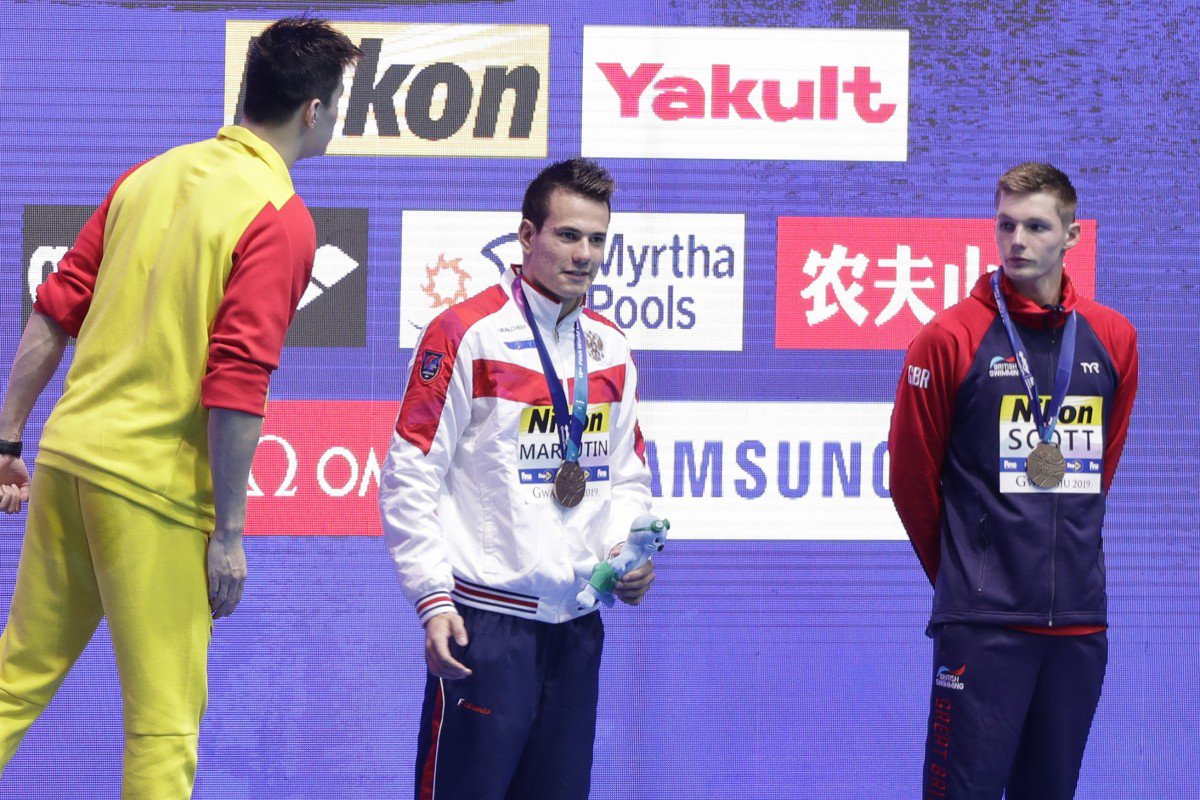
By Nancy Armour |
Clean athletes are done playing nice when it comes to doping.
After watching the International Olympic Committee and the international governing bodies do nothing as drug cheats make a mockery of their sports and the spirit of competition, two swimmers took matters into their own hands at the world championships this week.
Britain’s Duncan Scott refused to share the podium or shake hands Tuesday with 200-meter freestyle champion Sun Yang, a three-time Olympic champion who has already served one doping suspension and now faces the possibility of a lifetime ban. Australia’s Mack Horton had done the same Sunday after Sun won the 400-meter freestyle.
“I don’t think anyone at FINA’s going to stand up for the athletes,” American Lilly King said, referring to swimming’s international governing body, “so the athletes have to stand up for themselves.”
Sure enough, FINA chastised both Horton and Scott for their actions. (It also warned Sun, who yelled at Scott from the podium and called him a “loser” as they were leaving.) In its letter to Scott, FINA made reference to its rule that allows swimmers to be sanctioned for “bringing the sport into disrepute.”
Isn’t that what this is all about?
Sun has long competed under a cloud of suspicion – Horton called him a “drug cheat” at the Rio Olympics in 2016 – and his latest incident has only added to the distrust. Sun is accused of smashing a sealed vial of his blood during an out-of-competition test last year, preventing the sample from being analyzed. He also made testers wait outside his home for almost an hour, and questioned the credentials of one of the testers.
Yet FINA gave Sun only a warning, ruling it did not qualify as a doping violation. The World Anti-Doping Agency appealed that decision, but with the hearing not until September, FINA gave Sun approval to compete at worlds, a decision that outraged many other swimmers.
“If you do step back and you hear or read the chatter or listen to what’s going on, yes, you want more to be done,” Dave Durden, the U.S. men’s coach, told The Washington Post.
That’s what makes all of this so maddening. Shouldn’t everyone want that? Shouldn’t the power brokers at the IOC and all these other federations want all of the athletes who are competing to be clean, and be doing everything in their power to ensure that’s happening?
And yet, we’ve seen time and again that they just don’t care.
The cauldron in Pyeongchang a year ago was still warm when the IOC made the spineless decision to lift its ban on Russia for a systemic doping program, despite clear evidence that Russia was still thumbing its nose at the quaint notions of clean sport and fair play.
Another battle royale is brewing ahead of the Tokyo Olympics, which begin a year from Wednesday, with Russian athletes still banned by track and field. A few athletes have been cleared to compete as neutral athletes, but Russia’s chances of being able to send a whole team to Tokyo don’t look promising after Reuters found that two coaches and one doctor who’d been banned for doping were still working with athletes.
As for FINA, it seems to go out of its way to give second, third and 40th chances to those accused or suspected of doping.
“Frustration is probably it,” Horton said after finishing second to Sun in the 400. “I think you know in what respect.”
At some point in their careers, athletes make a conscious choice: earn success the hard way, maximizing their natural talent with grueling workouts and personal sacrifice, or take a chemically enhanced shortcut. Human nature being what it is, there will always be some who opt for the shortcut, taking the calculated risk that they won’t get caught.
When they do, though, there have to be consequences. Real consequences, not these laughable slaps on the wrist or appeasement presented as punishment.
Clean athletes are tired of waiting for the IOC and the guardians of their sport to do what’s right. The protests at the world championships might seem like a small measure but, make no mistake, the rebellion has begun.
This article was republished with permission from the original author and 2015 Ronald Reagan Media Award recipient, Nancy Armour, and the original publisher, USA Today. Follow columnist Nancy Armour on Twitter @nrarmour.